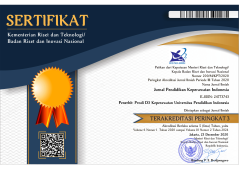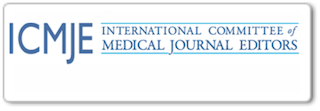The Impact of A Self-Education Mobile Application (Hd-Sema) on Quality of Life Among Hemodialysis Patients
Abstract
Introduction: Quality of life is an essential aspect in assessing the management of hemodialysis (HD) patients' overall well-being. Therefore, researchers developed a mobile application called HD-SEMA (Hemodialysis Self Education Management). HD-SEMA application is designed to provide health information and guidance regarding self-management in HD patients. Objective: Researchers are interested in conducting research aimed at finding out the influence of the HD-SEMA mobile application on the quality of life of HD patients. Methods: A quasi-experimental two-group pretest-posttest design with repeated measures was employed. The study was conducted in West Java with 60 participants (30 intervention, 30 control). The intervention group used the HD-SEMA application for four weeks, with sessions conducted twice per week (30–40 minutes each). The control group received standard hospital education. Quality of life was measured using the KDQoL-SF36. Results: Description of Quality of Live in the pre-test intervention group with a mean value of 45.81 and SD 9.33 and post-test 50.03 and SD 8.24. The quality of Live identification results in the intervention group is between the average score of the pre-test and post-test with a value of t=-9.16 and a significance value of 0.000. the mean difference value is 4.22, and the significance value is 0.000. This value shows the difference between the average self-management score of the intervention group and the control group. Conclusions: IT-based intervention is the proper intervention to increase knowledge in self-management in CKD patients so that the patient's quality of life also improves. HD-SEMA also helps patients assess their progress over time by tracking changes in health parameters and disease progression. This evaluation allows patients to evaluate the effectiveness of their treatment and make necessary changes.
Keywords
Full Text:
PDFReferences
Ahmadzadeh, S., Matlabi, H., Allahverdipour, H., & Khodaei Ashan, S. (2017). The effectiveness of the self-management program on quality of life among hemodialysis patients. Progress in Palliative Care, 25(4), 177–184. https://doi.org/10.1080/09699260.2017.1345407
Akram, B., Ahmad, H. S., Akhtar, M. T., Bilal, A., & Iqbal, K. (2023). Duration of Hemodialysis and its Impact on Quality of Life. Pakistan Journal of Health Sciences, 31–35. https://doi.org/10.54393/pjhs.v4i10.1009
Anjum, W., Qazi, Z., Gul, M., Khalid, A., & Sageer, I. (2024). ANXIETY, DEPRESSION, FAMILY INCIVILITY, AND QUALITY OF LIFE AMONG HEMODIALYSIS PATIENTS. 31(01), 66–74. https://doi.org/10.53555/jptcp.v31i1.3926
Ariyani, H. G. H. R. L. S. B. L. S. N. R. H. R. P. P. . (2019). GAMBARAN KARAKTERISTIK PASIEN GAGAL GINJAL KRONIS DI UNIT HEMODIALISA RUMAH SAKIT UMUM DR. SOEKARDJO KOTA TASIKMALAYA. Jurnal Keperawatan & Kebidanan, 3(2).
Armiyati, Y., Hadisaputro, S., Chasani, S., & Sujianto, U. (2021). Factors Contributing to Intradialytic Hypertension in Hemodialysis Patients. South East Asia Nursing Research, 3(2), 73. https://doi.org/10.26714/seanr.3.2.2021.73-80
Barlow, J., Wright, C., Sheasby, J., Turner, A., & Hainsworth, J. (2002). Self-management approaches for people with chronic conditions: a review. Patient Education and Counseling, 48(2), 177–187. https://doi.org/10.1016/S0738-3991(02)00032-0
Hartati, S., & Winarti, R. (2020). Mother’s knowledge level about cervical cancer in the East Jakarta area. Enfermería Clínica, 30, 108–112. https://doi.org/10.1016/j.enfcli.2019.12.039
Hosseini, A., Jackson, A. C., Chegini, N., Dehghan, M. F., Mazloum, D., Haghani, S., & Bahramnezhad, F. (2023). The effect of an educational app on hemodialysis patients’ self-efficacy and self-care: A quasi-experimental longitudinal study. Chronic Illness, 19(2), 383–394. https://doi.org/10.1177/17423953211073365
Khachian, A., Zeighami, K., Khoubbin Khoshnazar, T. A., & Haghani, H. (2023). The Effectiveness of Self-Management Education Based on the Mobile Application on the Quality of Life of People with Parkinson’s Disease. Middle East Journal of Rehabilitation and Health Studies, 10(2). https://doi.org/10.5812/mejrh-131057
Laporan Riskesdas 2018 Nasional. (n.d.).
Lee, M. C., Wu, S. F. V., Hsieh, N. C., & Tsai, J. M. (2016). Self-Management Programs on eGFR, Depression, and Quality of Life among Patients with Chronic Kidney Disease: A Meta-Analysis. In Asian Nursing Research (Vol. 10, Issue 4, pp. 255–262). Korean Society of Nursing Science. https://doi.org/10.1016/j.anr.2016.04.002
Ma, L. C., Liu, Y. M., Lin, Y. C., Liao, C. Te, Hung, K. C., Chen, R., Lu, K. C., Ho, K. F., & Zheng, C. M. (2022). Factors Influencing Self-Management Behaviors among Hemodialysis Patients. Journal of Personalized Medicine, 12(11). https://doi.org/10.3390/jpm12111816
Marinho, C. L. A., Gomes, O. V., da Silva Junior, G. B., & Schwingel, P. A. (2023). Smartphone and application use in self-management of chronic kidney disease: a cross-sectional feasibility study. Sao Paulo Medical Journal, 141(4). https://doi.org/10.1590/1516-3180.2022.0078.R2.09082022
Melastuti, E. N. H. F. A. (2018). Gambaran Karakteristik Pasien Hemodialisis di Rumah Sakit Islam Sultan Agung Semarang. Jurnal Ilmiah Kesehatan Rustinda, 4(2).
Notoatmodjo, S. (2012). Promosi Kesehatan dan Perilaku Kesehatan. Rineka Cipta.
Pack, S., & Lee, J. (2021). Randomized controlled trial of a smartphone application‐based dietary self‐management program on hemodialysis patients. Journal of Clinical Nursing, 30(5–6), 840–848. https://doi.org/10.1111/jocn.15627
Park, O. L., & Kim, S. R. (2019). Integrated self-management program effects on hemodialysis patients: A quasi-experimental study. Japan Journal of Nursing Science, 16(4), 396–406. https://doi.org/10.1111/jjns.12249
Qu, X., & Shen, P. (2023). Investigating polymorphisms related to chronic kidney disease and the effect of health and nursing education on self-management ability and quality of life in hemodialysis patients. Cellular and Molecular Biology, 69(1), 25–29. https://doi.org/10.14715/cmb/2022.69.1.5
Rostami, Z., Tavallaii, S.-A., Jahani, Y., & Einollahi, B. (2011). Assessment of Quality of Life in a Single-Center Transplantation Population Using the Kidney Transplant Questionnaire-25 Questionnaire. Transplantation Proceedings, 43(2), 590–591. https://doi.org/10.1016/j.transproceed.2011.01.078
Sangrawee Maneesri, Khemaradee Masingboon, & Nujjaree Chaimongkol. (2022). Effectiveness of Individual and Family Self-Management Combined mHealth Program for People with Stage 3 Chronic Kidney Disease: A Randomized Controlled Trial. Pacific Rim International Journal of Nursing Research, 27(1), 169–184. https://doi.org/10.60099/prijnr.2023.260340
Supriyadi, R., Rakhima, F., Gondodiputro, R. S., & Darmawan, G. (2019). Validity and Reliability of the Indonesian Version of Kidney Disease Quality of Life (KDQOL-36) Questionnaire in Hemodialysis Patients at Hasan Sadikin Hospital, Bandung, Indonesia. In Acta Med Indones-Indones J Intern Med • (Vol. 51).
Yonata, A., Islamy, N., Taruna, A., & Pura, L. (2022). Factors Affecting Quality of Life in Hemodialysis Patients. International Journal of General Medicine, 15, 7173–7178. https://doi.org/10.2147/IJGM.S375994
DOI: https://doi.org/10.17509/jpki.v11i1.77528
Refbacks
- There are currently no refbacks.
Jurnal Pendidikan Keperawatan Indonesia(JPKI) published by Indonesia University of Education. JPKI is licensed under a Creative Commons Attribution-ShareAlike 4.0 International License.
Office :
Nursing Department. FPOK UPI.
229, Dr. Setiabudhi Street. Bandung 40154
West Java , Indonesia
E-mail : jpki@upi.edu

_.png)
_.png)
_.png)











